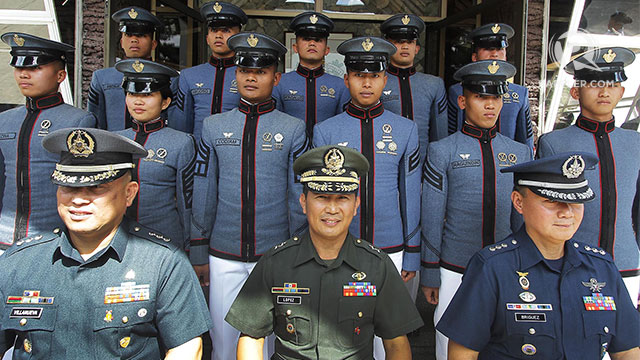From Rappler (Mar 12):
PH faces major hurdle in China case
In the first
place, should the arbitral tribunal hear the historic case?
Before anything
else, the Philippines needs
to clear this major hurdle – a question on jurisdiction – in its case against China over the West Philippine Sea (South China Sea).
To attack the
case, Chinese analysts argue that the arbitral tribunal lacks jurisdiction.
In a recent
forum, Philippine Solicitor General Francis Jardeleza said the tribunal will
rule on jurisdiction “together with the merits,” or the meat of its arguments.
Since China is unlikely to participate and prolong the
case, the Philippines
expects the ruling by 2015.
“We hope to win
on both, that we have jurisdiction and they will approve all of our claims,”
Jardeleza said.
The Philippines is
set to submit its memorial, or written pleading in the case, by March 30.
Sources told
Rappler that China offered incentives to stop the Philippines from doing this. Other
observers warned that if the Philippines
does, China
is ready with its “sticks.”
'Tactically
better off'
Jardeleza said
the Philippines
will discuss both jurisdiction and merits in its memorial.
In other
arbitration proceedings, he said, parties “bifurcate” the case. This means they
tackle jurisdiction first, then the merits. In these cases, he said the first
question is: “Do you or do you not have jurisdiction? Indeed if there is no
jurisdiction, there is no need to go into the merits.”
He said the Philippines
“proposed to the tribunal that we do it together.” “We are tactically better
off having both jurisdiction and merits,” he said.
Jardeleza
explained the Philippines
chose to do this because the country is “very strong on the merits.”
“If you have a
very strong case, you do not talk about jurisdiction. You go to straight to the
case,” he said.
“And then,” he
added, “if you convince the judges that you're strong on the merits and our
claim is just, then the issue of jurisdiction will be folded in as a win on the
merits. That's the reason why while ordinarily, you go first for a question on
jurisdiction, in the particular circumstances of this case, the legal team
decided that we propose – and we were allowed – to discuss jurisdiction and the
merits at the same time.”
Jardeleza said it
ends up cheaper, too, “because then you just spend once on one memorial.” He
declined to reveal the cost.
What China 'does not
accept'
Chinese analysts,
on the other hand, reject the tribunal's jurisdiction by citing a declaration China made on
Aug 25, 2006.
In this
declaration, China
said it “does not accept” arbitral jurisdiction over certain disputes. One of
the excluded disputes, which the Chinese often cite, involves sea boundary
limitations.
The United
Nations Convention on the Law of the Sea (UNCLOS) allows such exclusions.
Philippine
Supreme Court Associate Justice Antonio Carpio said disputes on maritime
boundary delimitation arise from overlapping exclusive economic zones (EEZs),
among others.
The EEZ is an
area 200 nautical miles from a country's baselines, or edges, within which a
state has the sovereign rights to explore and exploit, and conserve and manage
natural resources, among others.
It has everything
to do about the right of Filipino fishermen to fish in the West
Philippine Sea. The Philippines
claims China
is violating this right every time it drives away Filipino fishermen there.
(READ: PH protests China's moves in Ayungin Shoal)
While the EEZ lies
at the heart of the Philippines'
argument, Carpio said the arbitral tribunal has jurisdiction over the historic
case. China, for one, “has
no EEZ that overlaps with the Philippines'
EEZ in the Scarborough area.” (READ: What's at stake in our case vs China)
He explained: “China’s baselines are either along the coast of
Hainan Island, which is 580 NM from Luzon, or along the coast of mainland China, which is 485 NM miles from the Zambales
coastline in Luzon facing Scarborough Shoal.
Even if you grant the Chinese-held Paracels an EEZ, the Paracels are about 480
NM from Luzon. To have overlapping EEZs, the
distance between the opposite baselines must be less than 400 NM. In the
Scarborough area, there is no baseline in Luzon
where its distance from the nearest Chinese baseline is less than 400 NM.”
Not among
China's
exceptions
In its
Notification and Statement of Claim, the Philippines raises several points to
prove the arbitral tribunal should hear the case.
The Philippines, for one, acknowledged the
exceptions that China
invoked in 2006.
It said none of
the exceptions allowed by UNCLOS, however, “is applicable to the Philippines'
claims in this arbitration.”
The country
explained: “It follows that the Philippines' claims do not fall within China's
Declaration of 25 August 2006, because they do not: concern the interpretation
of Articles 15, 74, and 83 relating to sea boundary delimitations; involve
historic bays or titles within the meaning of the relevant provisions of the
Convention; concern military activities or law enforcement activities; or
concern matters over which the Security Council is exercising functions
assigned to it by the UN Charter.”
“I will simply
say that the entire legal team that has been engaged by the Philippines believes that the Philippines has
a strong case, both on jurisdiction and on the merits,” Reichler said.
http://www.rappler.com/nation/52764-philippines-china-arbitral-tribunal-jurisdiction
.jpg)
.jpg)





